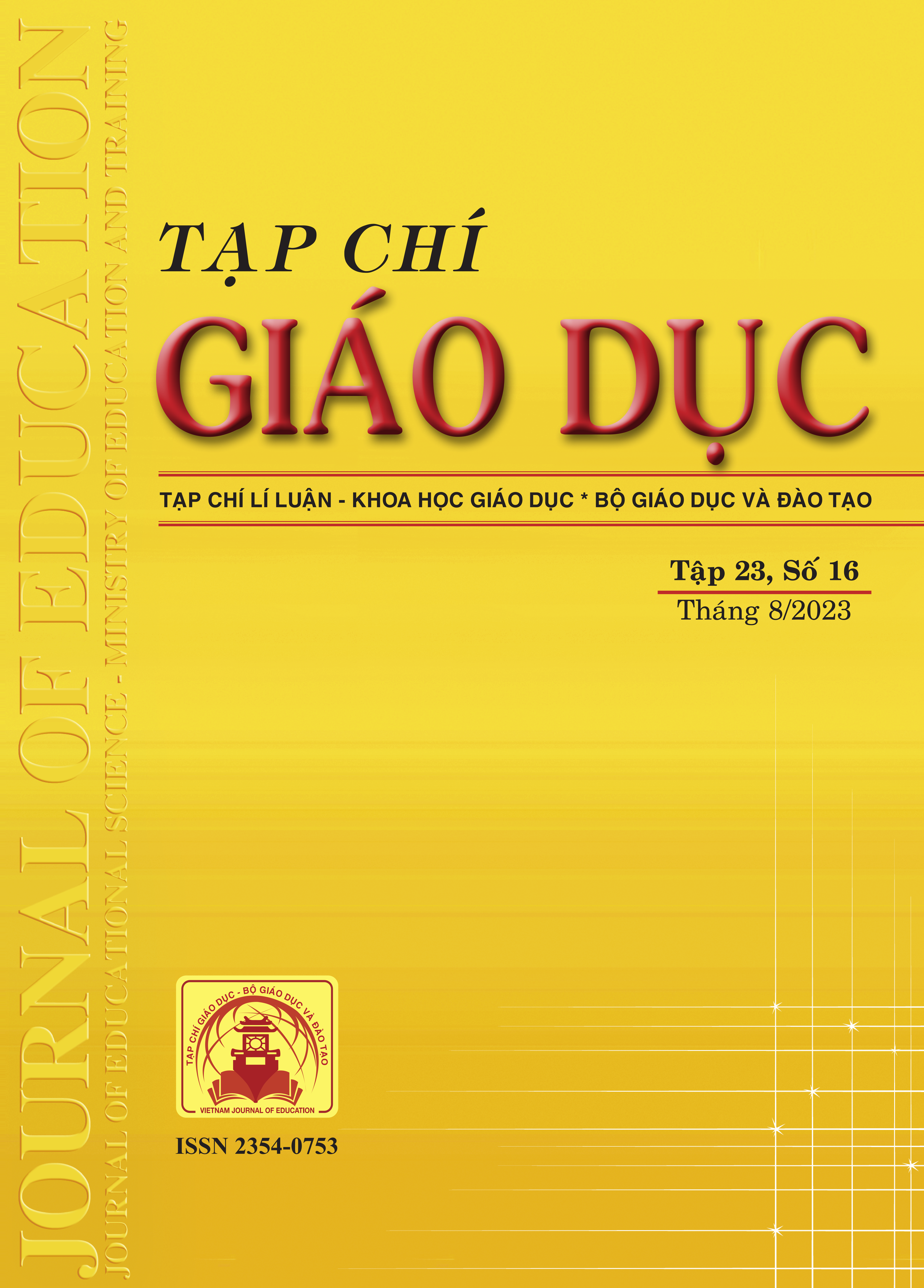Xây dựng câu hỏi đánh giá năng lực khoa học theo quan điểm PISA trong dạy học Sinh học 10
Tóm tắt
Vietnam's 2018 general education program is progressing in the direction of developing student competency, in line with the goal of assessing student capacity according to the PISA approach. However, teachers face many difficulties when designing teaching tools to assess students' scientific competence according to the General Education Program in Biology. The study uses theoretical methods including systematization and comparison of related documents to identify similarities in requirements and design of questions to assess scientific competence in Biology and PISA questions, thereby proposing the process of designing questions to assess students' scientific competence from PISA perspective and giving illustrative examples corresponding to the proposed process in teaching Biology 10. The research results are references to support teachers in developing a set of questions to assess scientific competence in the teaching process to develop students' scientific competence in Biology.
Tài liệu tham khảo
Anaya, L., Iriberri, N., Rey-Biel, P., & Zamarro, G. (2022). Understanding performance in test taking: The role of question difficulty order. Economics of Education Review, 90, 102293.
Bộ GD-ĐT (2011). Sổ tay PISA dành cho cán bộ quản lí giáo dục và giáo viên trung học. Văn phòng PISA Việt Nam - Viện Khoa học Giáo dục Việt Nam.
Bộ GD-ĐT (2018). Chương trình giáo dục phổ thông môn Sinh học (ban hành kèm theo Thông tư số 32/2018/TT-BGDĐT ngày 26/12/2018 của Bộ trưởng Bộ GD-ĐT).
Bộ GD-ĐT (2020). Kiểm tra, đánh giá học sinh trung học phổ thông theo hướng phát triển phẩm chất, năng lực môn Sinh học (Tài liệu hướng dẫn bồi dưỡng giáo viên phổ thông cốt cán). Chương trình ETEP.
Cao Thị Thặng, Nguyễn Cương, Trần Thị Thu Huệ (2012). Phát triển năng lực phát hiện và giải quyết vấn đề thông qua dạy học môn Hóa học cho học sinh trung học phổ thông. Tạp chí Giáo dục, 279, 29-30.
Đặng Thị Dạ Thủy (2018). Các dạng bài tập nghiên cứu trường hợp phát triển năng lực giải quyết vấn đề của học sinh trong dạy học phần “Sinh vật và môi trường” (Sinh học 9). Tạp chí Giáo dục, 421, 39-42.
Đinh Quang Báo, Phan Thị Thanh Hội (2019). Phân tích, so sánh chương trình môn Sinh học trong Chương trình giáo dục phổ thông 2018 và Chương trình môn Sinh học hiện hành. Tạp chí Giáo dục, 465, 1-5; 32.
Lê Đình Trung, Phan Thị Thanh Hội (2016). Dạy học theo định hướng hình thành và phát triển năng lực người học ở trường phổ thông. NXB Đại học Sư phạm.
Martins Azinheiro, C. A., Olmos Migueláñez, S., & Torrecilla Sánchez, E. M. (2021, October). School effectiveness and the PISA tests. Improvement of the development of student's competences in the centers of Portugal. In Ninth International Conference on Technological Ecosystems for Enhancing Multiculturality (TEEM'21) (pp. 723-727).
Mohamed, D. S. M. P. H., Sahminan, S. H., Len, G. A., & Shahrill, M. (2019, December). Teachers’ awareness, understanding and challenges regarding the PISA implementation. In AIP Conference Proceedings (Vol. 2194, No. 1, p. 020066). AIP Publishing LLC.
Nguyễn Thanh Huyền (2016). Thiết kế và sử dụng tình huống có vấn đề trong dạy học Sinh học. Tạp chí Giáo dục, 394, 48-50; 30.
Phạm Thị Hồng Tú, Nguyễn Thị Ánh Tuyết (2017). Sử dụng bài tập thực tiễn nhằm phát triển năng lực giải quyết vấn đề cho học sinh trường phổ thông dân tộc nội trú trong dạy học chủ đề “Di truyền học người và bảo vệ vốn gen của loài người” phần Di truyền học, Sinh học 12. Tạp chí Giáo dục, 413, 48-52.
Putra, N. S. (2021). Scientific literacy competency of senior high school students based on question formats. In Journal of Physics: Conference Series (Vol. 1882, No. 1, p. 012161). IOP Publishing.
Rahmayani, N. S., Arifin, M., & Sunarya, Y. (2019). Profile of senior high school students’ scientific literacy in Banda Aceh. In Journal of Physics: Conference Series (Vol. 1157, No. 4, p. 042024). IOP Publishing.
Ruiz-Primo, M. A., & Li, M. (2015). The relationship between item context characteristics and student performance: The case of the 2006 and 2009 PISA Science items. Teachers College Record, 117(1), 1-36.
Sari, K. B., Sahyar, & Sani, A. R. (2021). The Development of Physics Test Instrument Based on PISA for Optical Topic in High School. In Journal of Physics: Conference Series (Volume 1811, The 2nd International Conference on Sciences and Technology Applications (ICOSTA) 2020 3 November 2020, Medan City, Indonesia). IOP Publishing.
Sartika, D., Nurlina, N., Mutmainna, M., Aris, N. A., & Musliana, M. (2023). The scientific literacy profile of senior high school student based on science competence dimension. In AIP Conference Proceedings (Vol. 2619, No. 1). AIP Publishing.
Vazquez-Alonso, A., & Manassero Mas, M. A. (2018). The epistemic knowledge of scientific competence in the evaluation PISA 2015. Revista de Educación, 380, 103-128.
Wibawa, R. A. P., Suciati, S., & Maridi, M. (2019, December). Problem solving profile and the implementation of Collaborative Problem Solving (CPS) module in biology. In AIP Conference Proceedings (Vol. 2194, No. 1). AIP Publishing.
Tải xuống
Đã Xuất bản
Cách trích dẫn
Số
Chuyên mục
Giấy phép

Tác phẩm này được cấp phép theo Ghi nhận tác giả của Creative Commons Giấy phép quốc tế 4.0 .












